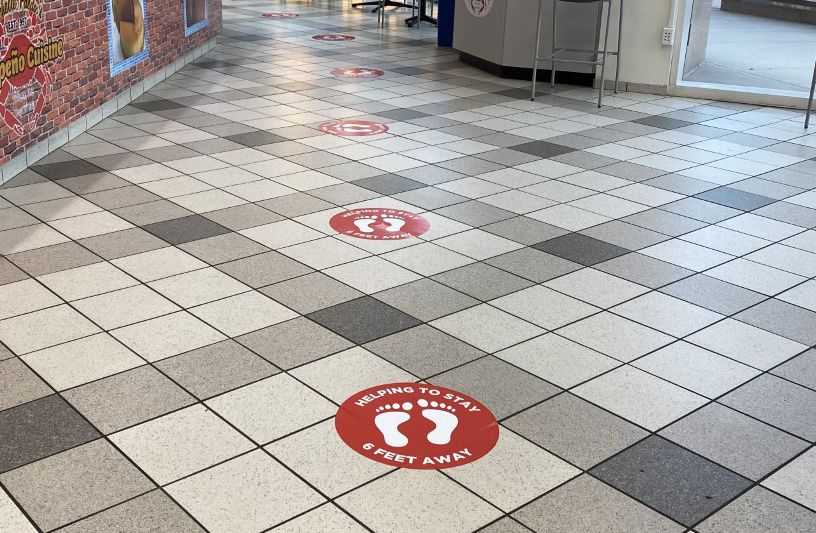
Indoor signs
6/22/2020

The path to learning has never been simple, with each student facing unique personal challenges and every school restricted by budgetary and resource limitations. Such obstacles have been uniquely compounded by the COVID-19 pandemic, which has deprived students of pivotal learning experiences and increased the “summer slide” loss of achievement gains made in the previous school year.
As lockdowns are gradually phased out and businesses reopen, many leaders in the educational space are asking: “Now what?”
With so much uncertainty, it’s easy to get overwhelmed as you try to build out a visual communication strategy for your own school or campus.
Fortunately, there are some key principles that all schools can follow – in tandem with local and state guidelines – to ensure you’re creating a learning environment that’s safe, welcoming and conducive to academic success.
Many of these strategies have already seen success in East Asian, European and other reopened economies, and include:
Below, we’ve outlined six of the most important signage tips to consider as you reopen your school or university.
 It’s likely that since school was last in session, the entrances and exits students have come to expect will have changed. If you’re enforcing temperature checks on arrival, you may have an entrance specific to this. Or there may be special entrances and exits depending on class or age group. The main entrance may even be closed altogether in favor of smaller temporary entrances.
It’s likely that since school was last in session, the entrances and exits students have come to expect will have changed. If you’re enforcing temperature checks on arrival, you may have an entrance specific to this. Or there may be special entrances and exits depending on class or age group. The main entrance may even be closed altogether in favor of smaller temporary entrances.
To eliminate confusion as students arrive, signage will be critical. On your school grounds, yard signs (also known as lawn signs) are easy to set up and can be used to direct people to the right spot at the right time. A-frames are bigger and sturdier but still easy to move, making them ideal for placing near entrances and exits, and for listing important health rules.
Most schools would also benefit from printing maps that mark entrance and exit routes to ensure students and staff know exactly where they should (and shouldn’t) be moving.

In all the excitement of returning to school and seeing friends again, it’s important that students are regularly reminded of their social obligation to help prevent the spread of COVID-19. This means signs enforcing hygiene best practices (such as hand washing, covering coughs and not touching faces) should be positioned throughout the campus, particularly in restrooms, cafeterias and lobbies. Restroom mirrors are a great place to install vinyl graphics reminding of these best practices.

When it comes to tables and desks, adding printed cleaning schedules and “sanitized” signs can help instill confidence that the spaces have been attended to.
Of course, in places like cafeterias and classrooms (if not all rooms), hand sanitizer should be readily available. Stations can be clearly marked with freestanding signs such as pedestal signs, A-frames or even banner stands.

Even as students return to school, they should be kept apart as much as possible to reduce the spread of disease. School administrators should establish safe distancing guidelines, such as having students sit at every other seat in the cafeteria or stand six feet apart in lines. Graphics are a great way to enforce these guidelines, with durable floor decals able to withstand heavy foot traffic much better than duct tape and other temporary fixes.

In close knit or highly social spaces such as school buses, classrooms and cafeterias, where students would normally sit close together, you’ll need to add signs and graphics to chairs and tables to mark spots as safe (or not safe) for sitting.

An additional protection beyond safety and social distancing guidelines is the use of clear protection screens. Use these to divide tables into semi-private spaces where students can socialize with a reduced risk of spreading germs through coughing, sneezing and talking.
They can also be installed at reception desks or as dividers for office areas, and can include a hole at the bottom to facilitate safe transactions and interactions. Graphics and lettering will help customize the screens to your school’s specific needs. You can even add your school colors, logos and mascots.

While meeting health and safety guidelines is paramount, no one wants their school to become a draconian prison of rules and regulations, which is why it’s important to continue promoting positive messages and words of encouragement.
Welcome students – whether new or returning – with big, bold banners positioned on your exterior walls and within hallways so students feel a sense of community as they navigate the building. Banner stands can achieve a similar effect when placed in and around main entrances. Of course, you’ll need to balance the placement of these carefully with that of health and safety info.

Another way to reinforce a sense of community is through visuals that evoke school pride. For example, a wall wrap or vinyl banner that shows students standing together in the face of adversity is likely to inspire hope and optimism.
Halls of fame and award displays will make students feel recognized for their achievements and motivate them as they return to school. These can come in many forms: stand-off signs, acrylic awards, routed signs, plaques and more.
These are just a few ways to advance your school’s signs and graphics as you reopen. However, every school has different needs, and the ongoing success and wellbeing of students and staff requires a full review of your specific requirements. It pays to work with an experienced specialist like Signs Now, who can help you plan a full signage overhaul from idea through installation, creating an environment that promotes safe learning, teaching and academic success.
Not sure where to begin? Start by downloading our reopening checklist below for a full list of communication strategies to follow as you reopen your school.
Download Our FREE Checklist To Get Started.

This resource outlines important tactics your school or educational institute can introduce as you reopen, including indoor and outdoor sign solutions, faculty and student communications, as well as important safety measures.
Fill out the form to download now.